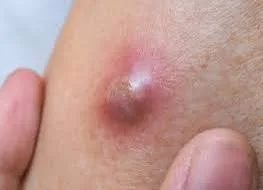A boil is a painful, red lump that forms under the skin. It usually starts small but can grow larger and fill with pus. So, what exactly causes a boil to appear?
1. Bacteria
The most common cause of boils is a type of bacteria called Staphylococcus aureus. This bacteria lives on your skin and inside your nose. Normally, it doesn’t cause any harm, but if it enters your body through a cut or hair follicle, it can lead to an infection, causing a boil to form.
2. Blocked Hair Follicles
Hair follicles are tiny pockets in the skin where hair grows. If a hair follicle gets blocked or damaged, it can trap bacteria inside, leading to an infection. The body responds to the infection by sending white blood cells to fight it off, and this creates the pus that fills the boil.
3. Weakened Immune System
If your immune system is not as strong, your body might struggle to fight off infections, making you more likely to get boils. People with conditions like diabetes or those who take medications that weaken the immune system are at a higher risk.
4. Poor Hygiene
If you don’t keep your skin clean, bacteria have more chances to enter through tiny cuts or irritated skin, increasing the likelihood of boils.
5. Sweating
Excessive sweating can irritate the skin, making it easier for bacteria to infect hair follicles, which can lead to boils. This is why boils often appear in sweaty areas like the armpits or thighs.
6. Friction
Constant rubbing or irritation of the skin, especially from tight clothing, can damage hair follicles and give bacteria a way in, causing boils to develop.
7. Close Contact with Infected People
Boils can be contagious. If you come into close contact with someone who has a boil, especially by sharing towels or clothing, you might also get one.
Conclusion
Boils are caused by bacteria, often when they infect a hair follicle or enter through a cut. Factors like poor hygiene, weakened immune systems, and constant friction on the skin can increase the chances of getting a boil. Keeping your skin clean and avoiding skin damage can help prevent them from forming. If you get a boil, it’s important to keep the area clean and see a doctor if it gets worse or doesn’t go away.


